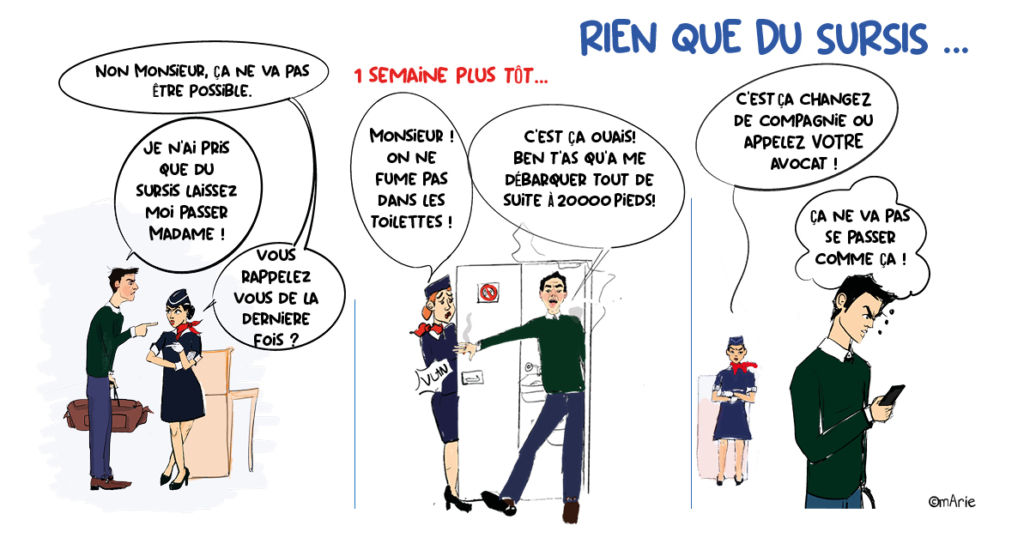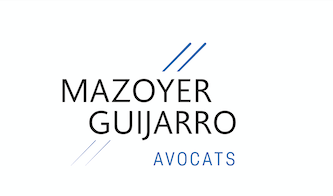
The summer is going to be difficult for airlines… This is essentially the forecast unanimously shared by the industry stakeholders, both because the airlines lack staff (pilots in particular), but also because the ground handling companies struggle to recruit staff on the ground.
Cancellations, delays, disruptions, are as much a cause for concern for the airlines as they are for passengers.
“To act in anger is to embark on a storm“: this proverb (of uncertain origin, sometimes French, sometimes German) should be meditated upon by the most sanguine of passengers, confronted with future disruptions, if they wish to embark not on the storm, but on board.
Indeed, as the IATA (International Air Transport Association) points out, airlines, governments and passengers are increasingly concerned by the growing frequency and seriousness of incidents committed on board aircraft (violence against the crew, other passengers, incivilities, failure to comply with safety instructions). These acts, although committed by a minority of passengers, threaten safety, disturb other passengers and crew and are a source of delays and re-routing.
Until very recently, these acts were very imperfectly sanctioned, mainly because of the absence of uniform international sanctions, but also, in the case of France, because of the inadequacy of the means of repression offered by domestic law.
Aware of these gaps, France adopted and promulgated an Ordonnance No. 2022-831 of June 1, 2022 , creating specific – and dissuasive – sanctions for these disruptive passengers.
We propose to present in the following few lines the rules available to airlines to prevent the occurrence of these difficulties.
What is a disruptive passenger?
A disruptive or unruly passenger is defined in Chapter 1 of Annex 17 to the Chicago Convention on International Civil Aviation as one who “fails to comply with the rules of conduct at an airport or on board an aircraft or who fails to follow the instructions of airport personnel or crew members and thereby disrupts good order and discipline at the airport or on board the aircraft.”
The disruptive passenger may be denied boarding, or even registered on a file that will prevent him or her from traveling on a particular carrier’s routes.
The right of an airline to deny boarding to a disruptive passenger
International Law and French Law allow the captain to refuse to board – or disembark – a passenger whose behavior may present a danger for the safety of the flight.
Regarding international law, the Tokyo Convention of September 14, 1963 and the Montreal Protocol of April 4, 2014, which entered into force on January 1, 2020 and was ratified by France on February 3, 2021, confer prerogatives and powers on the aircraft captain. The captain may take restraining measures to ensure the safety of the aircraft or persons or property on board, maintain good order and discipline on board, enable him to hand over the said person to the competent authorities or disembark him.
Regarding French law, Article L 6522-3 of the Transport Code, paragraph 1, provides in the same sense that “The captain has authority over all persons on board. He has the right to disembark any person among the crew or passengers, or any part of the cargo, who may present a danger to the safety, health, sanitation or good order on board the aircraft.”
The captain can thus refuse to board or, if the facts are committed in flight, decide to disembark the passenger whose behavior will be considered by him as disruptive.
As such, it has been ruled that airline’s staff may deny boarding to a passenger whose attitude does not comply with the general conditions of carriage (CA Paris, November 15, 2012, No. 11/01742).
The right of an airline to establish a file to prohibit the transport of disruptive passengers
The establishment of a nominative file (two words that generally arouse the alarms of any contemporary lawyer) of passengers that an airline does not wish to carry (or no longer wishes to carry) is not prohibited in principle.
Regulation (EU) No. 2016/679 of April 27, 2016 (known as “GDPR”) simply frames the establishment of such a file, which must comply with the five main principles of the rules on personal data protection (purpose, proportionality, limited retention period, principle of security and confidentiality, right to information). Moreover, validation by the French Commission Nationale Informatique et Libertés, “CNIL” is no longer required, except in exceptional cases. However, an impact study is still required in order to assess the compliance of the planned file with the provisions of the GDPR Regulation.
The airline Air France, even before the GDPR came into force, had established such a file which it had submitted to the control of the CNIL (it was then compulsory), which had validated it. Similarly, the French Court of Cassation implicitly validated this type of prohibition in a judgment of January 18, 2017 (No. 15-21802), noting that the airline Air France was legitimate to prohibit the transport of a passenger, for eighteen months, given the behavior that the latter had adopted during a previous flight.
Caution is obviously required when establishing a personal file, but there is nothing to prevent airlines from implementing legitimate means to prevent difficulties, rather than having to deal with such behavior that affects the safety of flights and the smooth travel of other passengers. Recent changes in French legislation, as we shall see, confirm this possibility.
That being said, airlines should now find in the new system adopted by France in June 2022, the means to effectively punish disruptive behavior committed on their routes.
The new sanctions created by the ordonnance n°2022-831 of June 1, 2022
The texts
The ordonnance of June 1, 2022, created a new section 3 in Chapter 1 of Title II, Book IV of Part VI of the Transport Code, soberly entitled “Passenger Behavior“, comprising three new articles: L 6421-5 to L 6421-7.
• Article L 6421-5 of the Transport Code reiterates known principles, namely that a passenger on a flight operated by public air transport must not, by his or her behavior, compromise or risk compromising the safety of the aircraft or that of persons or property on board.
• Article L 6421-6 provides that air carriers (those holding an operating license issued by France) may report to the administrative authority any facts that they consider to constitute a breach of the provisions of Article L 6421-5, and which are subject to certain penalties.
• Article L 6421-7 specifies that the agents responsible for noting the breaches provided for in article L 6421-6 are, by reference to article L 6431-1 of the Transport Code, officers and agents of the judicial police, civil servants and agents of the State, flight personnel carrying out in-flight checks on behalf of the administration and military personnel, sailors and agents of the military or maritime authority, commissioned for this purpose and sworn. For the sake of completeness, it should be added that these observations may also be made, under the terms of these same texts, by civil servants of the administrative bodies of category A of the civil aviation, commissioned for this purpose and sworn in.
The sanctions
The sanctions instituted by the ordonnance are of two types: administrative sanctions, including on the one hand a fine, provided for by (new) articles L 6432-4 to L 6432-8 of the Transport Code, and on the other hand a ban on boarding an aircraft, governed by (new) articles L 6432-9 to L 6432-13; and a criminal sanction.
Administrative sanctions
- Administrative fine
The administrative fine is incurred, according to article L 6432-4 of the Transport Code, in the following three cases:
– The use of an electronic or electrical device when its use has been forbidden by the crew.
– Obstructing the performance of the safety duties of the flight crew.
– Refusal to comply with a safety instruction given by the flight crew.
The limitation period for the sanctioning of the breach by an administrative fine is two years from the day the breach was committed, and not from the day it was observed (article L 6432-7). This two-year period is usual in air transport – it is the period within which the passenger can hold the air carrier liable under international conventions.
The fine cannot exceed €10,000 (article L 6432-6).
- Prohibition to board an aircraft
The sanction here is original and strong.
According to the new article L 6432-9 of the Transport Code, the competent administrative authority, in addition to imposing a fine based on article L. 6432-4, may also impose a ban on boarding an aircraft. Article L 6432-4, may prohibit an air passenger from boarding an aircraft operated in public air transport by an air carrier holding an air carrier’s operating license issued by France, when it is established that the passenger is likely to jeopardize the safety of the flight crew, other passengers, the aircraft or the property on board or to constitute a serious danger to the safety of the flight.
The ban (like the fine) is pronounced after a written debate (L 6432-10); it cannot exceed two years (or four years if, in the two previous years, the passenger has been banned), and can be partially or totally suspended (L 6432-11).
The banning order must indicate, among other things, the air carriers responsible for its implementation, which are then required to cancel the tickets issued, to refuse to issue new tickets and, of course, to refuse the passenger access to the aircraft if he or she presents himself or herself for boarding (article L 6432-12, paragraph 2).
Criminal sanctions
In addition to the above-mentioned administrative sanctions, the ordonnance creates a new criminal offence, provided for and punishable by Article L 6433-3 of the Transport Code, according to which “the fact that a passenger compromises the safety of an aircraft in flight by the voluntary destruction, degradation or deterioration of one of its components or of the safety equipment on board is punishable by five years’ imprisonment and a fine of 75,000 euros.”
In addition to the few means at their disposal to ensure a certain level of flight policing, airlines now have the legal means to punish the behavior of passengers whose relative de facto immunity, it is to be hoped, will gradually come to an end.
